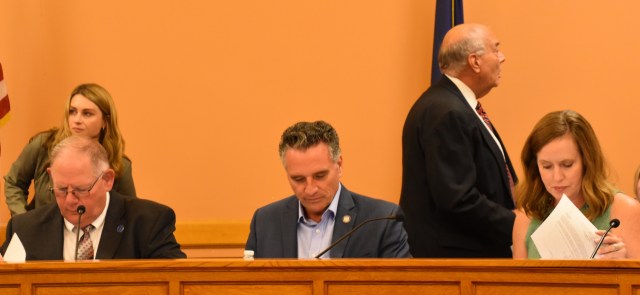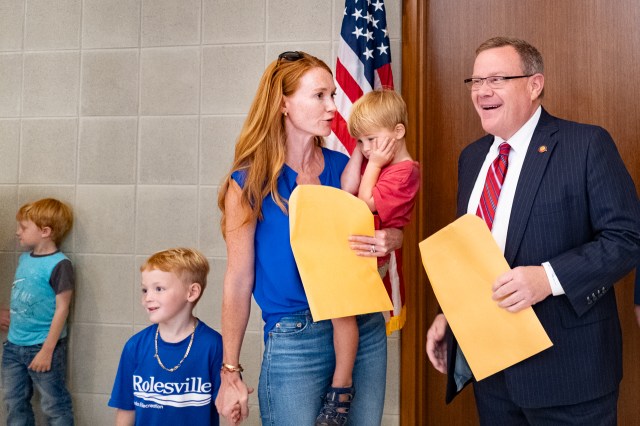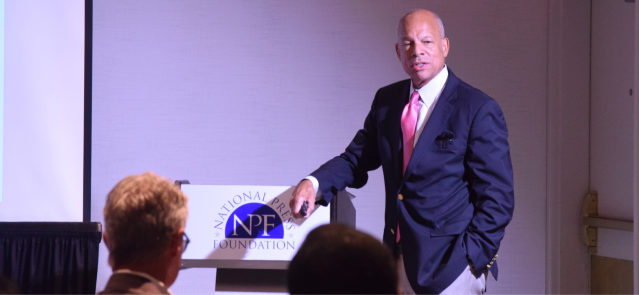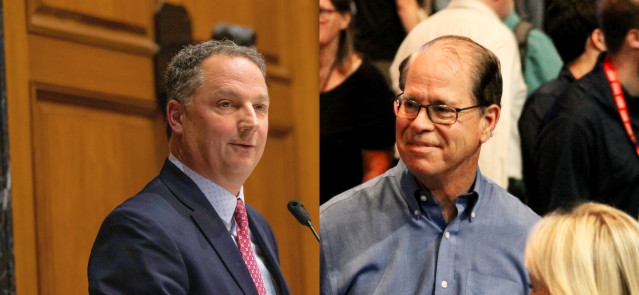Stay ahead of the curve as a political insider with deep policy analysis, daily briefings and policy-shaping tools.
Request a DemoLegislative Coordinating Council renews contract with KanFocus, wants bids for servicer to track 50 states
The Legislative Coordinating Council on Tuesday renewed its bill tracking services contract with KanFocus but also authorized a subcommittee to kick-start a process to solicit bids for providers with the ability to track legislation in all 50 states.
The initial recommendation was to renew the contract with KanFocus for four months to bridge the gap of the expired contract until the start of the 2025 legislative session.
The council reached a compromise with a representative of KanFocus, allowing the contract to be renewed for a year at approximately $108,000, the 2022 price point. KanFocus, which has provided its bill tracking services to the Kansas Legislature for the past 18 years, entered the meeting in search of a rate increase. A two-year extension was also on the table.
Speaker Pro Tem Blake Carpenter, R-Derby, objected to the one-year contract renewal, asserting that legislative staff and revisors immediately need the “best product available” and waiting another year would be counterproductive.
“We should give them as many tools as possible in order to make their jobs as easy as possible,” Carpenter said. “And a search function of the 50 states would make their jobs a whole lot easier if it’s already built into the system they’re using.”
Carpenter added that a company that can track in every state shouldn’t have an issue getting “the software up and running before the 2025 session.”
“I think we are needlessly binding our hands at this point,” he said. “And I think we can, and should, look at what alternatives are out there to get our members the best product available.”
Senate Minority Leader Dinah Sykes, D-Lenexa, indicated she wasn’t that concerned about KanFocus’ ability to track bills beyond Kansas because her office relies on other providers and the Legislative Research Department for bill tracking.
“I do have concern that we say, ‘They have to have access to all 50 states,’” Sykes said of the request-for-proposals document provided by Tom Day, director of Legislative Administrative Services. “My staff works really well with KanFocus.”
Sykes added that she’s heard positive feedback from representatives of other governmental agencies using KanFocus, highlighting the company’s ability to provide real-time updates of legislation.
“They really like [KanFocus] for Kansas specifically because it’s up-to-date as amendments are being included and addressed,” she said. “Whereas some of those other options don’t have access to that in-the-moment [activity].”
Day indicated during the meeting that KanFocus might be equipped to track in all 50 states if it linked its services to other states’ “application programmable interfaces.”
Senate President Ty Masterson, R-Andover, asked if KanFocus would be qualified to submit a contract bid if it’s not equipped to track services in all 50 states. House Speaker Dan Hawkins, R-Wichita, replied that Day’s request-for-proposals memo stipulates the servicer must be able to provide legislation for every state. But Day told State Affairs that his document was merely a draft and “things could change considerably.”
Masterson contended that the expiring contract should be renewed in order to avoid a service interruption but wanted further review of the expanded tracking option via the council’s subcommittee on administration.
Carpenter objected to Masterson’s motion to approve the one-year contract and refer the request for proposals to the subcommittee, asking that it be divided into separate motions. Carpenter argued that the subcommittee is unevenly composed of two Senate members and only one House member. Instead of referring the item to the subcommittee, Carpenter asked that the council resume discussion at a future meeting.
Masterson did not appear amused by Carpenter’s substitute motion, asking if “Robert’s Rule of Order” applied to the request. It was determined that Hawkins, who chairs the council, makes the determination.
“I’ve never been in an LCC meeting that divided a question,” Masterson said.
“The House and Senate should have an equal voice in this matter,” Carpenter said, adding he wants “a place at the table” to engage in dialogue.
Carpenter further noted he is passionate about the issue while also calling for a “legitimate” vetting process.
“I want to make sure that as many people are able to participate as possible, including the folks over at KanFocus,” he said.
Sykes clarified for Carpenter that the subcommittee would merely be reviewing the parameters of Day’s draft proposal, not evaluating and choosing a bid submission, which the council selects.
“This is a way to widen it and see everything that is out there,” Hawkins said.
Carpenter ultimately dissented on the motion to renew the agreement with KanFocus.
Matt Resnick is a statehouse reporter at State Affairs Pro Kansas/Hawver’s Capitol Report. Reach him at [email protected].
Summit Truck Bodies invests $50M in 2nd Wathena plant
Summit Truck Bodies will invest $50 million to build a new plant in Wathena and double the company’s output.
Gov. Laura Kelly announced the plan Wednesday.
The plant will go next to the existing production and warehouse facility, with construction scheduled to be completed in 20 months. The company expects the expansion to create 80 new jobs.
“Summit Truck Bodies’ expansion is proof that our dedicated workforce, quality of life, and central location draw businesses across various industries,” Kelly said in a news release. “Kansas will continue to partner with first-class companies like Summit Truck Bodies to ensure communities throughout the state have opportunities to prosper.”
The new facility will include a 200,000-square-foot manufacturing space for service body production and the final assembly of service trucks. The plant also will have 20,000 square feet for office spaces and showrooms.
The company will use the current 132,000-square-foot facility for manufacturing lube trucks, drawer systems, cranes, body refurbishments and parts sales.
“A concerted focus on strengthening our state’s advanced manufacturing sector is not only attracting companies from around the world but encouraging existing companies to expand operations right here in Kansas,” Lt. Gov./Commerce Secretary David Toland said in the release. “Working with companies like Summit Truck Bodies is what will keep our state on the dominant trajectory of growth we’re experiencing.”
Summit Truck Bodies Plant Manager Chris Walter said the expansion will “maximize our production efficiency.”
“The advanced equipment will improve fabrication and paint speed, reduce physical strain on our workers, and ensure consistent high quality,” he said in the release.
Wathena Mayor John Hontz said in the release the city is excited about the expansion.
Bryan Richardson is the managing editor at State Affairs Pro Kansas/Hawver’s Capitol Report. Reach him at [email protected] or on X @RichInNews.
Nearly all of Indiana’s public universities critical of state’s proposed high school diplomas
Nearly all of Indiana’s public universities have criticized the state’s proposed high school diplomas, letters sent to top state education officials show.
Education officials have published a draft rule that would create two high school diplomas: the Indiana Graduates Prepared to Succeed diploma and the Indiana Graduates Prepared to Succeed Plus diploma. They would replace Indiana’s four current diplomas and are designed to give students more coursework flexibility. They also place a greater emphasis on students earning college credit and completing work-based learning opportunities in high school.
At the request of education officials, Indiana’s public universities have shared their feedback on the proposed diplomas. Letters to Indiana’s top education officials show most of the universities are wary of the proposed diplomas in their current state.
Their responses came during the draft rule’s first comment period, which closed Tuesday. Indiana Secretary of Education Katie Jenner has said education officials will make changes to the proposed diplomas based on feedback and open a second comment period. The Indiana State Board of Education is expected to unveil the adjustments during its Aug. 14 meeting.
In the letters, many of the universities lauded the state’s goals but questioned if the proposed diplomas would result in unintended consequences. Several universities noted the diplomas, as proposed, appear to conflict with the Indiana Commission for Higher Education’s HOPE Agenda, particularly its goal of improving the state’s slumped college-going rate.
Tony Hahn, Vincennes University’s vice president of government and legal affairs, and Lori Pence, its associate provost of K-12 programs and partnerships, wrote earlier this month that the proposed diplomas should, at a minimum, have equivalent math and English requirements to Indiana’s current Core 40 diploma. They also argued work-based learning opportunities should have credits and grades attached to them to ensure consistent outcomes.
“We applaud the effort to include new opportunities for credit, but we must not lose sight of the need for rigor and baseline mastery to ensure that every high school graduate, regardless of ZIP code, socio- economic status, high school size, or family situation has an opportunity to succeed at Vincennes University,” Hahn and Pence wrote.
Aaron Trump, vice president for government affairs and general counsel at the University of Southern Indiana, wrote that the proposed diploma’s “lack of required, global knowledge is concerning.” In his letter, he suggested Indiana retain the Core 40 with Academic Honors diploma or produce an equivalent diploma.
“Historically students with the Core 40 Honors diploma have been most prepared and most successful in post-secondary education,” Trump wrote. “Eliminating this rather than replacing it creates a gap for best achieving and most ambitious students.”
In June, education officials put forward three optional diploma seals — one each for enrollment, employment and enlistment — as a solution to critics’ worries and a way to signal a student’s competency. The seals would be jointly developed with corresponding experts and would appear on a student’s transcript, the officials say.
The universities’ letters indicate the institutions have coalesced around a tiered enrollment seal in an effort to address their concerns.
Purdue University President Mung Chiang sent a letter to Jenner and Chris Lowery, commissioner of the Indiana Commission for Higher Education, explaining the state’s proposed diplomas do not meet his university’s admission requirements in the subject areas of math, lab sciences, social studies and world language. In another letter, Purdue asked education officials to consider a tiered enrollment seal. Under Purdue’s recommendation, one tier would incorporate Indiana’s Core 40 diploma requirements. A second tier would incorporate most, but not all, of the state’s Core 40 with Academic Honors diploma requirements.
Ball State University also suggested a two-tiered enrollment seal, along with course sequencing and a comprehensive communications campaign for students, families and schools. Indiana University President Pamela Whitten, in a letter to Jenner and Lowery, called for the universities to be involved in crafting the enrollment seal.
Indiana State University President Mike Godard, in another letter, indicated a tiered enrollment seal is being contemplated. He expressed reservations about the approach, though, saying it could confuse students and families.
“We don’t have any concerns about the current diploma options,” Godard wrote.
For months, educators, students and parents have criticized the state’s plan to “reinvent” high school, arguing the proposed diplomas lack rigor and present many financial, transportation, equity and safety challenges.
Education officials have listened to hours of public comments and invited the public to submit feedback online. In addition, they have met with stakeholders and industry leaders who have shared their thoughts.
“This feedback is an indispensable and statutorily required part of the process and is helping to shape not only the foundational courses and competencies required for all students, but also the proposed and still in-development enrollment-ready seal, specifically designed to guide and academically prepare students who will or may want to go to college,” an Indiana Department of Education spokesperson said in an email to State Affairs.
The department believes the enrollment seal “will be key to ensuring every Hoosier student and their parents clearly understand the specific courses and experiences they need in high school in order to be successful in higher education. Continued partnership with higher education institutions, as well as the Indiana Commission for Higher Education, will be essential to this process.”
Contact Jarred Meeks on X @jarredsmeeks or email him at [email protected].
BMV proposes closing Griffith license branch
The Bureau of Motor Vehicles has proposed shutting down a license branch in Lake County, which would be the second such closure this year.
BMV officials announced Wednesday that a public hearing on closing the Griffith branch had been scheduled for Aug. 14. A final decision on the branch’s future will be made by agency officials in the weeks following the hearing.
Closure of the Griffith branch would leave six BMV offices in Lake County — one each in Crown Point, East Chicago, Gary, Hammond, Merrillville and Schererville.
The BMV decided in early July to shut down its Madison Avenue branch in Indianapolis as of Aug. 30. That will be the first license branch closure since 2022, when the bureau shuttered six offices.
The bureau said it has continued reviewing branch operations amid the ongoing shift of motorists completing their BMV transactions online or at kiosks rather than in person at a branch.
The Indianapolis branch closure will leave 119 branches in the BMV’s system, with at least one in all 92 counties as required by state law.
Non-branch transactions grew to 53% of the BMV’s total in 2023 from 34% in 2018, according to agency reports.
BMV officials cited that transaction shift last year as they made widespread changes to branches’ operating hours. That action included ending Saturday hours at 19 locations around the state.
The Griffith branch’s public hearing is set for 6 p.m. Aug. 14 at Griffith Town Hall.
Tom Davies is a Statehouse reporter for State Affairs Pro Indiana. Reach him at [email protected] or on X at @TomDaviesIND.
Georgia named No. 1 state for bridge quality
As Georgia’s booming population and economy increase transportation across the state, the government’s recent investment in infrastructure has done the work to bear the weight.
A new report from ConsumerAffairs found Georgia is the top state in the country for its quality of bridges. Seventy-five percent of Georgia’s bridges — the highest percentage in the nation — are in “good” condition. That also surpasses the national average by about 30%.
These findings mark a major turning point for the Peach State, considering its previous years of infrastructure issues.
Continue reading “Georgia named No. 1 state for bridge quality”Afternoon Update for Wednesday, July 31, 2024
Despite skewing young with a low percentage of voting age members, a group of citizens visiting the Legislature got to meet with House Speaker Tim Moore on Wednesday. One mom brought five kids to join her in pressing legislators to clear the waitlist for private school vouchers.
Funding the state’s Opportunity Scholarship program fully was a priority for both chambers over the summer, but it fell victim to the impasse in budget negotiations.
Moore assured parents that full funding still has support and should be passed retroactively later in the year. He then turned his attention to the children, slapping high fives and telling them not to miss the dinosaurs across the street at the North Carolina Museum of Natural Sciences.
Moore also said all children visiting the Legislature deserve ice cream from their parents.
Not so fast, one mom said. “We have to save our money for tuition.”
Moore laughed and said she should go into politics. “I walked right into that one.”
Watch Moore’s comments on clearing the waitlist.
After the session concluded, Moore said there wasn’t a path to funding the program before the start of the school year, particularly in light of a likely veto by Gov. Roy Cooper. His hope is that the Legislature can approve the funding retroactively in September or November, preferably as part of an overall budget compromise.
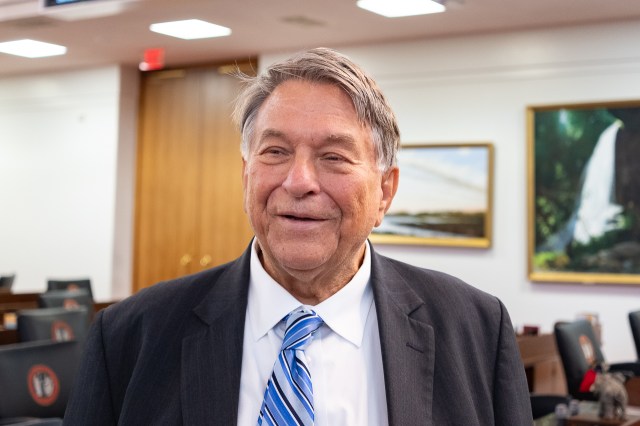
During the session, the House made quick work of three vetoes on House Bills 155, 556 and 690. Notice of the overrides was sent to the Senate, which is not meeting this week. Moore announced the House will have no further business this week.
Most of Wednesday’s session was allocated to moments of personal privilege and announcements by legislators.
Rep. Julia C. Howard, R-Davie, currently in her 18th term, was named a senior chair of the House Finance Committee and awarded a gavel. “All hail the queen,” Rep. Mitchell S. Setzer, R-Catawba, remarked as Howard returned to her seat escorted by Rep. John A. Torbett, R-Gaston.
Rep. Jason Saine, R-Lincoln, addressed legislators for the final time on the House floor ahead of his retirement next month. “I asked Speaker [Harold] Brubaker one time like six or seven years ago: ‘How did you know when it was time to leave?’ He said, ‘You just wake up one morning and you know.’”
Saine said such a moment occurred to him during a trip to Italy earlier this summer. “I was just alone in my thoughts, and that’s when I decided that I think it’s time to do something else.”
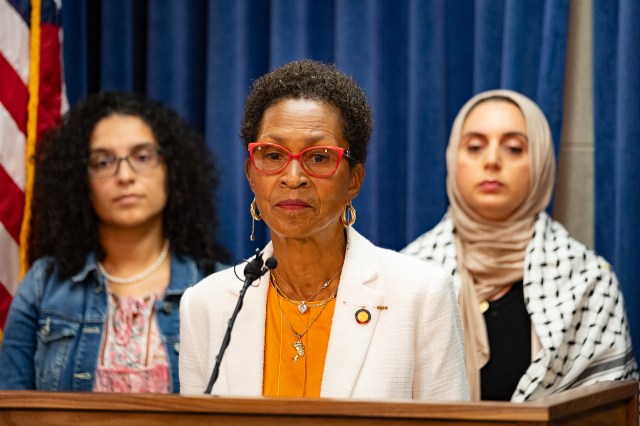
Earlier in the day at a news conference, Rep. Maria Cervania, D-Wake, and Rep. Renée A. Price, D-Orange, spoke in support of a letter demanding a cease-fire in Palestine and Israel addressed to the Biden-Harris administration and the state’s congressional delegation.
Nearly 50 elected officials in North Carolina have signed the letter, co-authored by Cervania; Price; Rep. Pricey Harrison, D-Guilford; Muslim Women For; and Jewish Voice for Peace.
“This letter was born from deep compassion and carefully crafted with sincerity and sensitivity,” Cervania said. “While we do not deal in international affairs on the state level of politics, we do hold authority to encourage our national officials to support efforts in peace.”
North Carolina elected officials sign letter demanding Israel-Palestine cease-fire
Nearly 50 elected officials in North Carolina have signed a letter addressed to the Biden-Harris administration and the state congressional delegation to demand a cease-fire in Palestine and Israel.
“This letter was born from deep compassion and carefully crafted with sincerity and sensitivity,” Rep. Maria Cervania, D-Wake, said. “While we do not deal in international affairs on the state level of politics, we do hold authority to encourage our national officials to support efforts in peace.”’
So far, 14 state representatives and Sens. Gladys A. Robinson and Michael Garrett, both D-Guilford, have signed the letter. Others include school board and city council members from across the state.
The letter, which has been in the works since the Hamas’ Oct. 7 attack in Israel, supports the Ceasefire Now Resolution, sponsored by U.S. Rep Cori Bush, and urges the release of all hostages held by Hamas and the Israeli government.
“Though the Middle East conflict is 6,000-plus miles away, its impact definitely is felt here in North Carolina, in our communities, within families and among our friends, be they Palestinian, Israeli, American or another nationality,” Rep. Renée A. Price, D-Orange, said. “We are unable to remain silent as this crisis worsens.”
Price encouraged elected officials to add their names to the letter, which was co-authored by Cervania; Rep. Pricey Harrison, D-Guilford; Muslim Women For; and Jewish Voice for Peace. Rep. Kanika Brown, D-Forsyth, was also present at the news conference Wednesday morning.
Samira Haddad, a local Palestinian organizer and second-generation Nakba survivor, said that local, grassroots organization is important to cause change in Washington, D.C., and that the letter is not merely symbolic.
Raleigh City Council member Christina Jones noted there has been a groundswell of support from over 250 citizens demanding a cease-fire resolution at their meetings, which led her to sign the letter.
In March, the Jewish Federation of Raleigh supported council members who voted no on a cease-fire resolution.
Steve Bader, a Triangle-area member of Jewish Voice for Peace, thanked every elected official who signed the letter. “An immediate, permanent cease-fire is critical when every single day more and more people are slaughtered,” he said.
In a speech to Congress last week, Israeli Prime Minister Benjamin Netanyahu, who has previously stated he is skeptical of accepting a cease-fire resolution, vowed to destroy Hamas’ military capabilities.
Haddad said the recent assassination of Hamas leader Ismail Haniyeh only exacerbated the intensity of the conflict and urgency of the letter. “This will only increase the determination and steadfastness of the Palestinian people, and any increase [in] violence by Israel will only increase our resistance,” Haddad said.
For questions or comments, or to pass along story ideas, please write to Matthew Sasser at [email protected] or contact the NC Insider at [email protected] or @StateAffairsNC
Former DHS secretary: Entities can never be certain of cyberattack security
DETROIT — Even if a private company or a government agency is “miles ahead,” they can never guarantee complete safety from a cyberattack, according to former Homeland Security Secretary Jeh Johnson.
“You can never be completely sure that you’re secure against a cyberattack,” he said after a National Press Foundation speech this week. “That’s like saying my roof will never leak.”
Last October’s Russian cyberattack on the Kansas judicial branch shut down online services for months, and the restoration process continued this month.
Johnson, who served as Department of Homeland Security secretary from 2013 to 2017, said there can be wide disparities in the levels of sophistication and investments in cybersecurity.
“I would say to the cybersecurity specialist, ‘You’re safe until you’re not,’” he said. “There are some that are 98% secure and some that are 75% secure.”
Kansas is working to beef up its cybersecurity efforts after the Legislature passed Senate Bill 291 this session.
Each branch of government will be required to have a cybersecurity official. The official will answer to the state’s top cybersecurity officers — the chief information security officer and the chief information technology officer.
The bill also requires every website that is maintained by a branch of government or state agency to move to a “.gov” domain before Feb. 1, 2025.
Asked about the federal government’s role in state cybersecurity, Johnson said he didn’t recall any conversations about judicial systems during his time as Homeland Security secretary.
But he provided an example of what federal-state collaboration can look like, starting when Homeland Security announced in 2016 the country was facing Russian interference in the election system.
“I thought it was a good idea to declare election infrastructure to be critical infrastructure,” he said. “I floated that idea with all 50 states’ secretaries of state. The ones who spoke for the most part were against it because they were suspicious that the federal government was going to somehow take over their election infrastructure.”
But Johnson testified in 2017 that many states eventually requested federal assistance for the election. He said this week the Cybersecurity and Infrastructure Security Agency, established in 2018, continues the efforts.
“I think CISA has come a long way in building these relationships,” he said. “I think it’s off to a good start, and I hope it continues.”
Bryan Richardson is the managing editor at State Affairs Pro Kansas/Hawver’s Capitol Report. Reach him at [email protected] or on X @RichInNews.
Braun revises property tax plan; Huston calls it starting point
Republican gubernatorial candidate Mike Braun has revised his property tax plan so that it meets the goal he set out last week of resetting all tax bills for owner-occupied homes to 2021 levels.
Braun announced the change Tuesday, acknowledging the proposed increases in homestead deductions in his initial plan would leave an undetermined percentage of homeowners without savings.
Republican House Speaker Todd Huston told State Affairs that Braun’s plan was a “great proposal to start from” but that he had not yet closely studied its impact.
Braun: all homeowner bills to ‘reset’ to 2021 levels
Braun’s plan released Friday centers on increasing homestead deductions to reduce the assessed value of homes. He also proposed imposing a maximum 3% annual cap on property tax bill increases, with a 2% cap for senior citizens, low-income residents and families with children under the age of 18.
Braun’s campaign released a statement Tuesday saying that “most Hoosiers have found they will see significant property tax cuts by resetting their tax bills to 2021 levels due to enhanced homestead deductions. However, some Hoosiers in high-tax districts would still find little relief.”
Braun’s statement said his plan was being revised so that “all Hoosier homeowners’ tax bills will be reset to the lower of their 2021 tax bill or the new bill based on enhanced deductions in my plan.”
Total property tax bills on owner-occupied homes increased statewide by 9% in 2021, 9.2% in 2022 and 16.7% in 2023, according to a Legislative Services Agency report.
“As Governor, I will embrace feedback from everyday Hoosiers on how to improve our state,” Braun said in the statement. “To ensure all homeowners benefit from my plan, I’m introducing an additional feature to this plan to guarantee all homeowners have their bills reset to at least their 2021 pre-Biden/Harris inflation levels.”
Braun’s campaign has not released any calculations on how much his proposal would reduce property tax collections and whether the tax burden would be shifted to business, agricultural or rental properties.
His campaign did not answer questions Wednesday from State Affairs on whether such an analysis was being prepared for release.
Braun has not proposed a possible replacement for potentially hundreds of millions in revenue declines for public school districts and local governments, which receive more than 90% of property tax revenue.
Huston: Braun plan ‘great place … to start from’
Braun’s proposal comes as the Legislature’s State and Local Tax Review Task Force continues its work on a review of the state and local tax structure, including property taxes, ahead of the new legislative session starting in January.
Huston said that if Braun is elected governor, his proposals will be considered along with whatever is produced by the task force led by House Ways and Means Committee Chair Jeff Thompson and Senate Tax and Fiscal Policy Committee Chair Travis Holdman.
“Senator Braun, like many of us, has heard our constituents’ concerns about property taxes, and he’s put together a proposal and I appreciate his leadership on that,” Huston said in an interview with State Affairs. “As we go into the next legislative session, it’s a great place, a great proposal, to start from. We’ll work with him and his team and our Senate colleagues to get something passed that addresses the property tax concerns of Hoosiers.”
Huston wasn’t ready to endorse the specifics of Braun’s proposal.
“We really haven’t had a deep discussion on it. Like anything involving property taxes, there’s things you have to work through,” Huston said. “We’ll work together with them on it to get something accomplished.”
Tom Davies is a Statehouse reporter for State Affairs Pro Indiana. Reach him at [email protected] or on X at @TomDaviesIND.

